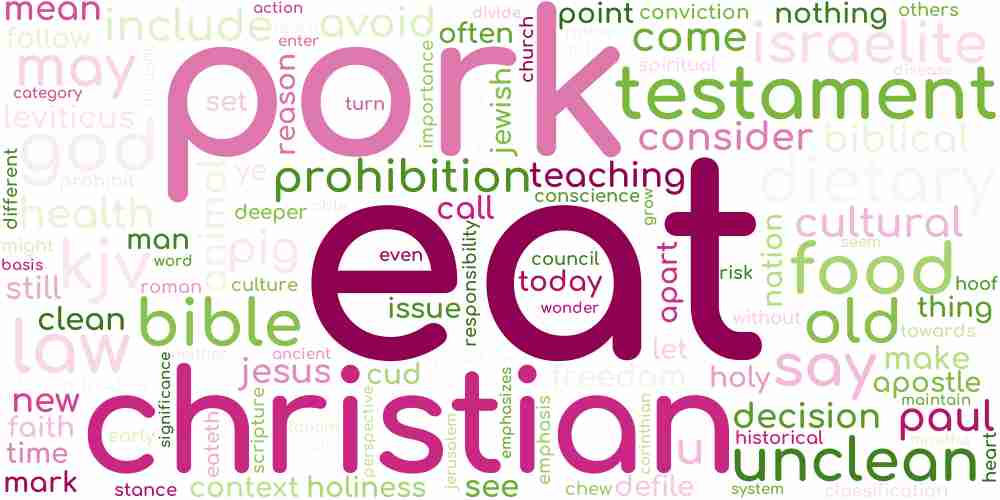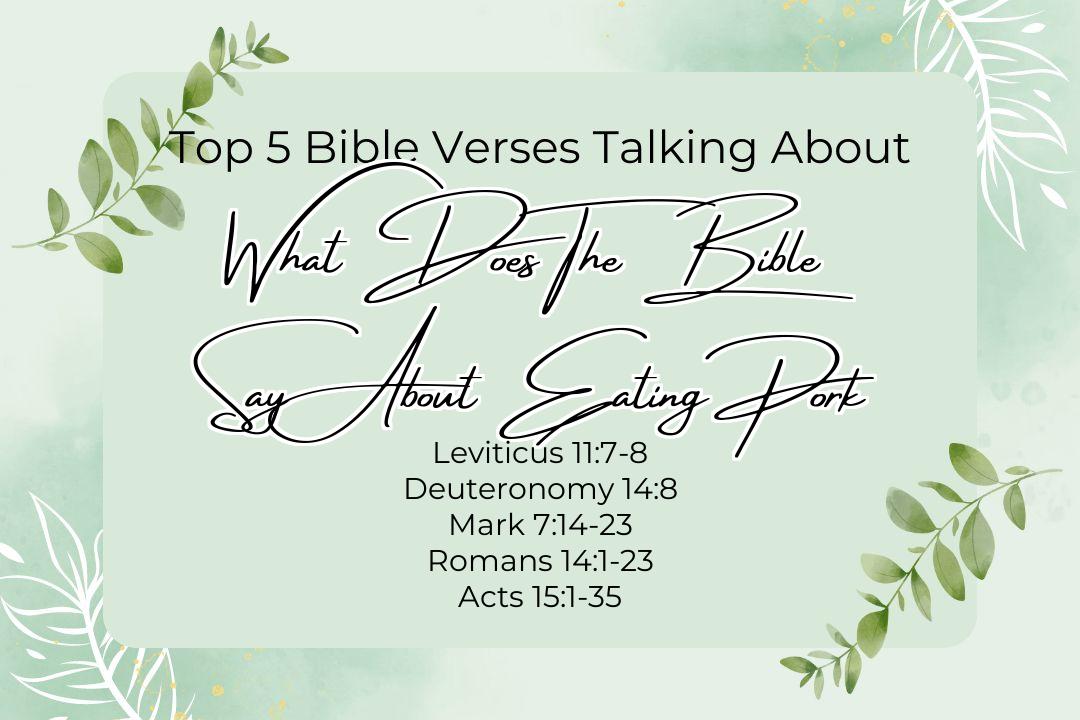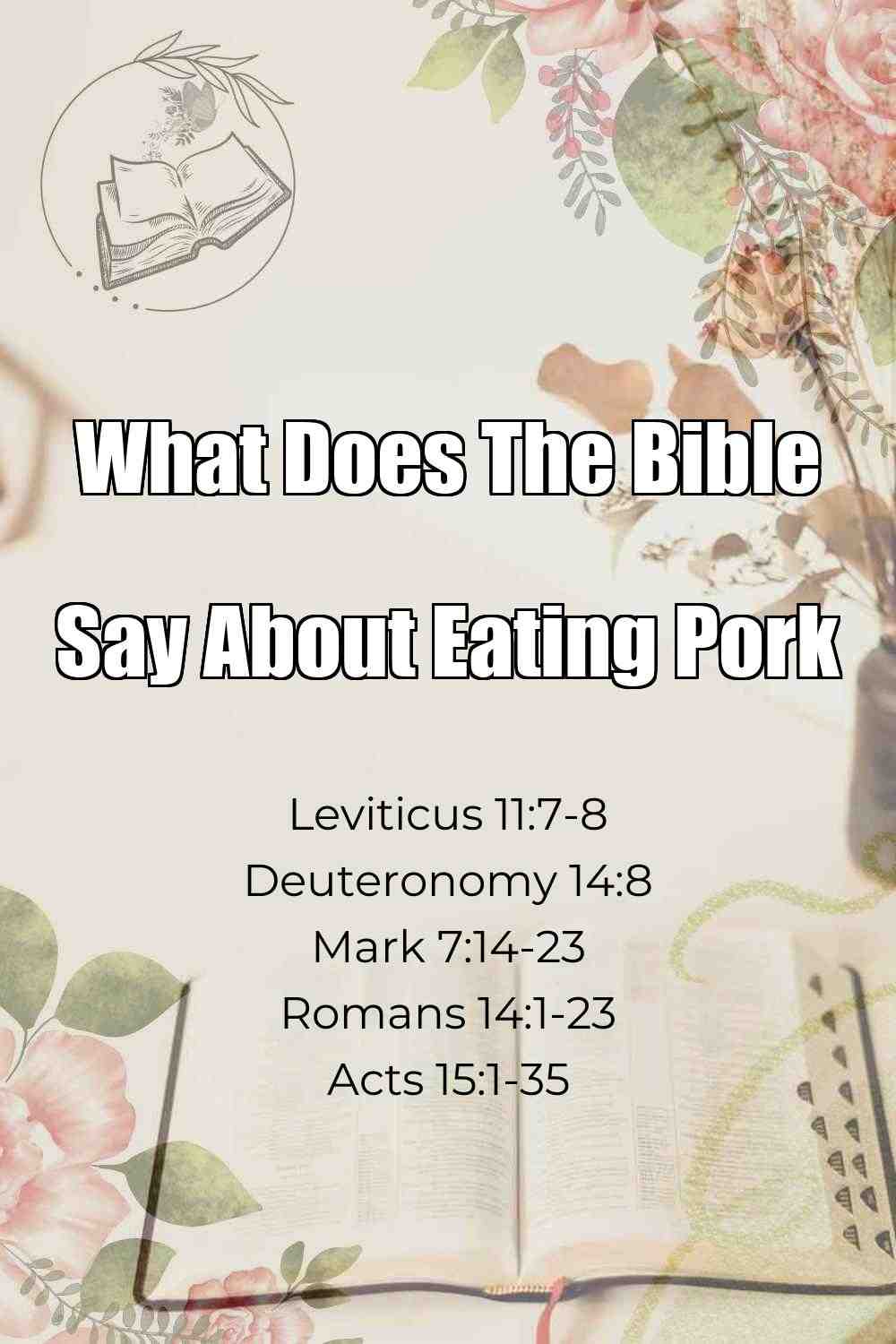You know how we love pork, right? We eat it at cookouts, or on special days like holidays, it’s part of our meals.
But, have you ever thought about what the Bible says about it? Like, is it bad to eat pork?
Could it hurt our health, or is it just up to us if we wanna eat it or not?
Let’s see what the Bible tells us about this.
Key Takeaways
- In the Old Testament, the Bible specifically prohibits the consumption of pork, stating that pigs are “unclean” animals (Leviticus 11:7-8, Deuteronomy 14:8).
- The reason for this prohibition is not explicitly stated, but it’s believed to be related to the pig’s diet and habits, which made it a potential carrier of diseases.
- In the New Testament, Jesus declares all foods clean, including pork, and emphasizes that it’s not what we eat that makes us unclean, but rather what comes out of our hearts (Mark 7:14-23, Romans 14:14).
- However, some Christian denominations, such as Seventh-day Adventists, still choose to follow the Old Testament dietary laws and avoid eating pork.
- The decision to eat pork or not is a matter of personal conviction and conscience, and Christians are encouraged to respect each other’s differences in this regard (Romans 14:1-15:7).
Let’s start with this word cloud, which highlights the primary themes we’ll cover now.

Word cloud by BibleBreathe.com about what does the bible say about eating pork word cloud
Top 5 Bible Verses About What Does The Bible Say About Eating Pork
For a richer view of what we’re talking about, these Bible verses are definitely worth checking out. They offer additional context and insights:

Picture by BibleBreathe.com about What Does The Bible Say About Eating Pork
Old Testament Prohibitions on Eating Pork
The Biblical Basis for the Prohibition on Eating Pork
I’ll be honest, I’ve always been curious about the Bible’s stance on eating pork.
Growing up, I was taught that pork was off-limits, but I never really understood why. So, let’s get into the biblical basis for this prohibition.
“And the swine, because he parteth the hoof and is clovenfooted, but cheweth not the cud, he is unclean unto you.” (Leviticus 11:7, KJV)
In Leviticus 11:7-8 and Deuteronomy 14:8, God clearly instructs the Israelites to avoid eating pork.
But why?
What’s so special about pigs?
The Classification of Pigs as Unclean Animals in the Old Testament
So, back in the Old Testament, animals were split into clean and unclean ones.
Pigs? They’re unclean. Why? ‘Cause they don’t follow the rules for clean –kosher– animals.
To count as clean, the animal needs to have split hooves and chew its cud.
Now, pigs do got split hooves, but they don’t chew cud.
Might seem kinda random to us, but for the Israelites, it was a big deal, like part of who they were.
By stickin’ to these food rules, they stayed pure and stood out from other groups.
The Cultural and Historical Context of the Prohibition on Eating Pork
So, why God told Israelites to not eat pork?
Maybe it’s because back then pigs were tied to stuff like idolatry and other weird pagan things.
When they stayed away from pork, the Israelites could keep clear of all that and stay loyal to God.
Pigs were also thought to be kinda gross, digging through dirty places for food.
Eating pork might’ve been bad for their health, so maybe it was just a way to keep ’em safe from getting sick.
In the end, the Bible’s rule about pork comes from the Old Testament rules and the times they lived in.
Even though we don’t follow these food rules now, learning about ’em helps us get how deep and layered the Bible is.
New Testament Perspectives on Eating Pork
Jesus’ Teachings: What’s Really Unclean?
As a Christian, I’ve often wondered what Jesus would say about eating pork.
In the New Testament, Jesus teaches that it’s not what we eat that makes us unclean, but what comes out of our hearts.
“There is nothing from without a man, that entering into him can defile him: but the things which come out of him, those are they that defile the man.” (Mark 7:15, KJV)
He emphasizes that true defilement comes from within, from our thoughts, words, and actions.
This teaching is reinforced in Matthew 15:10-20, where Jesus explains that what we eat doesn’t necessarily make us unclean, but rather what we say and do.
The Apostle Paul’s Views: Freedom and Responsibility
Paul talks about meat, like pork, in kinda the same way. In Romans 14 and 1 Corinthians 8, he says stuff about freedom and doing the right thing.
He says, we can eat what we want, but we gotta think about how it might bother other people.
As Paul says,
“But food does not commend us to God: for neither if we eat, are we the better; neither if we eat not, are we the worse.” (1 Corinthians 8:8, KJV)
What we eat or don’t, doesn’t really make us more good or bad in how God sees us.
The Jerusalem Council’s Decision: A Turning Point
The Jerusalem Council had this big talk about what foods we can eat. It’s in Acts 15:1-35, if you want to check it.
That meeting kinda changed things for us Christians.
Peter, James, Paul—they were all there, big names, right?
They came up with the idea that people who weren’t Jewish didn’t need to follow all those old rules about food, like the one where you can’t eat pork.
This was a pretty big deal, since Jewish people had been sticking to those rules for a long time.
But now, us Christians, we focus more on things like being free and showing grace.
So, we don’t have to stick to the food rules from back in the Old Testament days anymore.
Instead, we should think more about love, kindness, and having self-control.
Now, about eating pork—what’s the Bible got to say?
Well, the New Testament kind of moves away from telling us what we can or can’t eat.
It talks more about being free and responsible, and about living in a way that’s led by the Spirit.
Theological and Health Considerations

Photo modified by BibleBreathe.com. Original photo by Aaron Burden on Unsplash
A Call to Holiness
As Christians, we’re called to live a life of holiness, and that includes considering what we eat.
“For I am the Lord your God: ye shall therefore sanctify yourselves, and ye shall be holy; for I am holy” (Leviticus 11:44, KJV).
Being holy, according to the Bible, means we’re supposed to be set apart for God.
And it also talks about what we eat, like food should be special too, for Him.
Holiness and Dietary Laws
Back in the Old Testament, God gave rules about food to the Israelites so they could be different from other people.
Pigs were called unclean becuase they don’t chew cud, which kinda meant they were a picture of something not clean inside, too.
But now?
We Christians, we ain’t living by those old rules, but by grace instead.
So, does that mean it’s fine for us to eat pork and not think about it?
Health Implications
Eating pork, yeah, well, it ain’t always the best, at least if you’re thinkin’ about it from back in the day, when food was kinda sketchy.
People worried about it way more than we do now.
Pork could make you sick with a thing called trich-something, some bug that gets ya if the pork ain’t cooked right.
That was a big deal back then.
But what about now?
If you cook it up real good, not much to worry about, they say.
Though, even with all the safety stuff now, folks still talk about how maybe pork ain’t the best for your body.
Things like cancers and heart problems have been tied to it, according to some studies.
The Role of Faith and Conscience
So, what does the Bible say about eating pork?
Ultimately, it comes down to faith and conscience.
“For every creature of God is good, and nothing to be refused, if it be received with thanksgiving” (1 Timothy 4:4, KJV).
If we can eat pork with a clear conscience, thanking God for the food we have, then it’s not a sin.
So, if you feel alright eating pork and give thanks for it, then it’s all good.
No problem.
But, if it makes you feel bad, like you shouldn’t be eating it, well, maybe just don’t.
Better to skip it if you’re not sure, you know?
As Paul said,
“Happy is he that condemneth not himself in that thing which he alloweth” (Romans 14:22, KJV).
Christian Traditions and Eating Pork
The Practices of Different Christian Denominations Regarding Eating Pork
As I dug deeper into what the Bible says about eating pork, I was fascinated by the varying stances of different Christian denominations.
Some Christian denominations, like Seventh-day Adventists, still observe the dietary laws of the Old Testament and abstain from eating pork.
On the other hand, most Protestant and Catholic denominations don’t consider eating pork a sin, based on New Testament teachings.
The Historical Development of Christian Attitudes Towards Eating Pork
Historically, the early Christian church was predominantly Jewish, and as such, most Christians observed Jewish dietary laws, including the prohibition on eating pork.
However, as Christianity spread to non-Jewish communities, the apostles and other early church leaders began to reevaluate these laws.
“What God hath cleansed, that call not thou common” (Acts 10:15, KJV).
This verse from Acts 10 marks a significant turning point in the development of Christian attitudes towards eating pork.
The Significance of Eating Pork in Different Cultural Contexts
In many Western cultures, pork is a staple of the diet, and Christians see no problem with consuming it.
However, in some Asian and African cultures, eating pork is still considered taboo, even among Christians.
In these contexts, the decision to eat or not eat pork is often influenced by cultural and social factors, rather than solely by biblical teachings.
Ultimately, whether or not to eat pork is a matter of personal conviction and cultural sensitivity.
Common Misconceptions and Misinterpretations
The idea that Christians are required to follow Old Testament dietary laws
When I started reading the Bible more, it hit me that a lot of people, we kinda think we’re supposed to still follow the Old Testament food rules.
But, the thing is, those rules were just for the Israelites, and there was a reason for it.
It was to make them different from others around them and to show them that the Messiah would come later.
“For I am the Lord your God: ye shall therefore sanctify yourselves, and ye shall be holy; for I am holy” (Leviticus 11:44, KJV)
The notion that eating pork is inherently sinful or immoral
I think that saying pork is worse than chicken or beef isn’t really what the Bible says.
Jesus said all kinds of food are okay to eat, even pork.
“There is nothing from without a man, that entering into him can defile him: but the things which come out of him, those are they that defile the man” (Mark 7:15, KJV)
The misconception that the Bible prohibits eating pork for health reasons
I heard people say Bible says no eating pork. They think pigs are bad or something.
But I don’t think science or the Bible really say that.
Actually, in the New Testament, it says Christians can eat any food they want.
“For every creature of God is good, and nothing to be refused, if it be received with thanksgiving” (1 Timothy 4:4, KJV)
Practical Applications and Implications
How Christians can make informed decisions about eating pork
I am a Christian and sometimes I wonder what the Bible say about pork.
When I was little, people told me that pork was “unclean,” so I shouldn’t eat it.
But when I looked more into the Bible, I found out it’s not so simple like I first thought.
In the Old Testament, God tells the Israelites to not eat some foods, like pork, to be different from other nations (Leviticus 11:7-8, KJV).
But then in the New Testament, Jesus say that all foods are clean and that it’s our hearts that really matter (Mark 7:14-23, KJV).
So, what does this means for us now?
How do we decide if we should eat pork?
For me, it’s about what I believe and being aware of culture.
I don’t think eating pork is bad, but I understand some Christians might still not want to eat it for many reasons.
The importance of respecting the convictions of others regarding eating pork
As the apostle Paul writes,
“Let not him that eateth despise him that eateth not; and let not him which eateth not judge him that eateth” (Romans 14:3, KJV).
I think it’s important to respect what others believe, even when we don’t think the same way.
It’s not good to judge or say bad things, but we should look at our own way of being with God.
For example, if I have a dinner party, I might not serve pork if I know some friends don’t like it.
Also, if someone offers me pork, I can say thank you and eat it, even if I usually don’t like it.
The relevance of biblical teachings on eating pork to modern-day issues of food and faith
Some people think the Bible’s rules about eating pork are old and don’t matter.
But really, it shows us something bigger: how our food and our beliefs mix together.
I believe Christians should think about what they eat.
It’s not just about being healthy, but it’s also about our spirit.
We need to think how what we eat affects our bodies, the people around us, and even the Earth.
These days, food is often made in factories and isn’t fresh.
So, the Bible’s ideas about being simple, thankful, and having control are important now more than ever.
As the French theologian and missionary, Jacques Ellul, once said,
“The table is a sacred place, a place of hospitality, of fellowship, of healing.”
May we approach our tables with reverence, gratitude, and a deep sense of connection to the earth, to each other, and to our Creator.
What Do You Think?
Got a meaningful interpretation of this verse? Share your thoughts in the comments!
Your reflections might provide new perspectives for others reading this passage.
If this post resonates, share it with others and explore more at BibleBreathe.com!

Photo modified by BibleBreathe.com. Original photo on Unsplash.
Frequently Asked Questions About What Does The Bible Say About Eating Pork
Is eating pork a sin in the Bible?
In the Old Testament, eating pork was considered unclean in Leviticus 11:7-8 and Deuteronomy 14:8. However, Jesus declared all foods clean in Mark 7:19. As Christians, we’re no longer bound by the Old Testament dietary laws. So, eating pork isn’t a sin, but it’s about being mindful of our freedom in Christ and not causing others to stumble.
What does the Bible say about eating pork in the New Testament?
In the New Testament, Jesus teaches that all foods are clean in Mark 7:19 and Acts 10:9-16. The apostle Peter has a vision where God tells him not to call anything unclean that He has made clean. This means that, as Christians, we’re free to eat pork and other foods that were previously considered unclean in the Old Testament.
Why did God forbid eating pork in the Old Testament?
In the Old Testament, God forbade eating pork as part of the dietary laws for the Israelites. One reason was that pigs were considered unclean animals because they didn’t have a divided hoof and didn’t chew their cud. This distinction was likely due to health concerns, as pigs can carry diseases. But for me, it’s also about understanding God’s desire for His people to be set apart and holy, reflecting His own character.
Is it okay for Christians to eat pork according to the Bible?
In the Old Testament, pork was considered unclean in Leviticus 11:7-8 and Deuteronomy 14:8. However, Jesus declared all foods clean in Mark 7:19 and Acts 10:9-16. As Christians, we’re no longer bound by the Old Testament dietary laws. So, yes, it’s okay for Christians to eat pork, but let’s remember to do so with gratitude and thanksgiving.
Matt Turner
I’m Matt, and I love breaking down Bible verses in a way that’s easy to understand and apply to everyday life. My goal is to help you connect with God’s Word and find practical ways to live it out. Whether you’re new to the Bible or just looking for some fresh insights, I’m here to walk with you and share what I’ve learned along the way.

